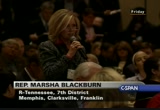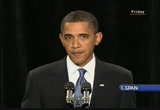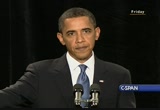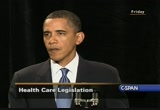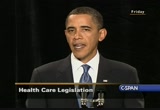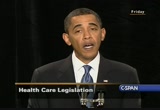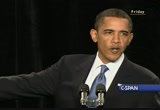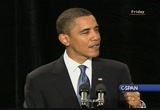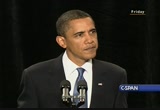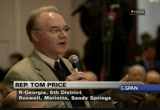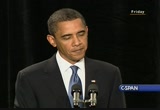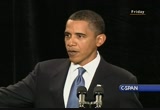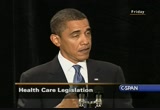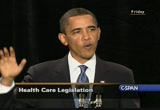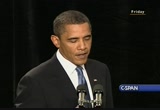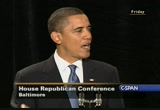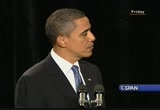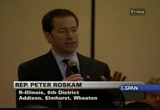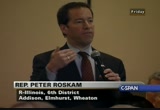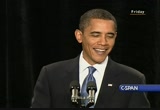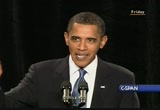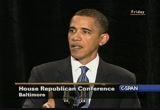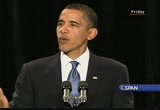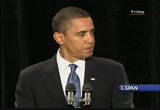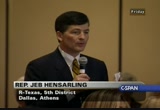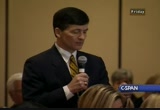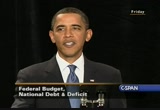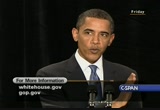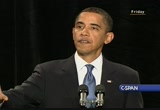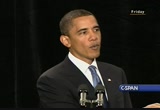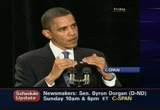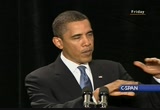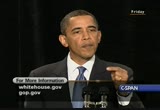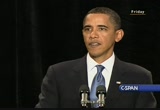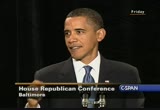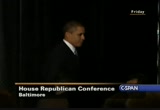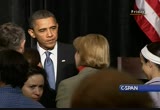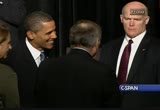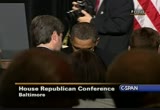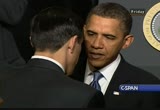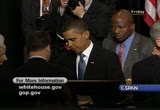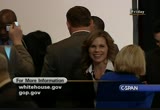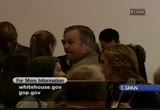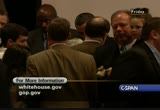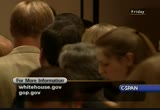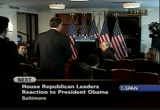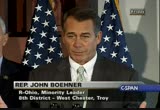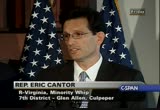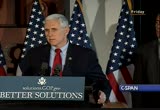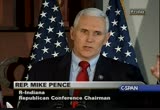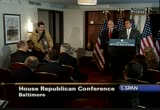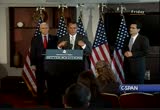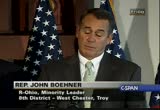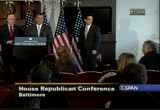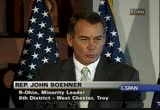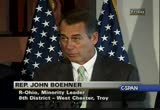tv C-SPAN Weekend CSPAN January 30, 2010 6:00am-7:00am EST
6:00 am
@@@@@@@ @ @ @ @ @ @ @ @ @ @ @ @ we were the test case, and our democratic caucus has cautioned that there may be lessons there that should be heeded, and would provide guidance for us to go forward. as you said, what we should be doing, is tossing old ideas out, bad ideas out, and moving forward in refining good ideas. certainly we would welcome good ideas. so my question to you is when will we look forward to starting anew and sitting down with you to put all of these ideas on the table to look at these lessons learned, to benefit from that experience and to produce a product that is going to reduce government interference.
6:01 am
[captions copyright national cable satellite corp. 2009] [captions copyright national [captioning performed by the national captioning institute] e [captioning performed by the embraced in our package. some of them are embraced with a caveat. let me give you an example. i think one of the proposals that have been focused on by the republicans as a way to reduce costs is allowing insurance companies to sell across state lines. we actually include that as part of our approach. the caveat is, we have got to do so with the minimum standards, because otherwise what happens is that you could have insurance companies circumvent a whole
6:02 am
bunch of state regulations about basic benefits or what have you, making sure that a woman is able to get mammograms as part of preventive care, for example. part of what could happen is insurance companies could go into states and cherry pick and just get those who are healthiest and leave those behind or least healthy, which would raise everybody's premiums to were not healthy, right? -- who were not healthy, right? so it is not that many of these ideas are not workable, but we have to refine them to make sure that they do not and a worsening the situation for folks rather than making it better. what i said at the state of the union is what i still believe. it can show me, and if i get confirmation from health care experts, people who know the
6:03 am
system and how it works, including doctors and nurses, ways of reducing people's premiums, covering those who do not have insurance, making it more affordable for small businesses, having insurance reforms that insure people have insurance even when they have got pre-existing conditions, that their coverage is not dropped because they're sick, that young people out of college or as they're entering the workforce can still get health insurance, if those component parts are things that you care about and what to do, i am game. i have got a lot of these ideas. the last thing i will say though, let me say this about health care and health care debate. i think it also bears on a whole
6:04 am
lot of other issues. if you look at the package that we have presented, and there are some stray cats and dogs a got in there that we were eliminating, we were in the process of eliminating. for example, we said from the start that it was going to be important for us to be consistent in saying to people if you can have -- if you want to keep the health insurance you got, you can keep it. you're not going to have anybody getting in between you and your doctor in your decision making. i think that some of the provisions the got snuck -- that got snuck in might have violated that pledge. we were in the process of scrubbing this and making sure
6:05 am
that it is tight. at its core, if you look at the basic proposal we have put forward, and has an exchange so that businesses and the self- employed can buy into a pool and get bargaining power the same way that big companies do, the insurance reforms i have discussed, making sure that there is choice and competition for those who do not have insurance. the component parts of this thing are pretty similar to what howard baker, bob dole, and tom daschle proposed at the beginning of this debate last year. now, you may not agree with bob dole and howard baker, and certainly you do not agree with tom daschle on much but that is not a radical bunch. if you were to listen to the debate and frankly, how some of you went after this bill, you would think that this thing was some bolshevik plot.
6:06 am
no, i mean, that's how you guys presented it. and i am thinking to myself, how is it that a plan that is pretty centrist -- no, look, i mean, i am just say, i know you guys disagree, but if you look at the facts of this bill, most independent observers would say that this is actually what many republicans -- is similar to what many republicans propose to bill clinton when he was doing his debate on health care. so all i am saying is, we have got to close the gap little bit between the rhetoric and reality. i am not suggesting that we are going to agree on everything. whether it is health care or energy or what have you. but if the way these issues are
6:07 am
being presented by the republicans is that this is some wild eyed plot to impose huge government in every aspect of our lives, what happens is you guys that do not have a lot of room to negotiate with me. i mean, the fact of the matter is, is that many of you, if you voted with the administration on something, are politically vulnerable in your own base, in your own party. you have given yourselves very little room to work in a bipartisan fashion because what you have been telling your constituents is, this guy is doing all kinds of crazy stuff that is going to destroy america. çóóand i would just say that we have to thifkip!out tone. ñiñrñrñiit is not just on your y
6:08 am
the way. it is on our side as well. this is part of what has happened in our politics, where we demonize the aside so much that when it comes to getting things done, it becomes tough to do. mike. >> dr. tom price from georgia and then we will have one more after that if your time permits, mr. president. >> you know, i am having fun. [laughter] [applause] >> ok. >> i want to stick on the general topic of health care but ask a specific question. you have repeatedly said most recently at the state of the union that republicans have offered no ideas and no solutions. in spite of the fact -- >> i do not think i said that. what i said was, within the context of health care -- i remember that speech pretty
6:09 am
well, it was only two days ago. i said i welcome ideas that you might provide. i did not say that you have not provided ideas. i said i welcome those ideas that you will provide. >> multiple times, from europe ministration, there have come statements the republicans have no ideas and solutions. in spite of the fact that we have offered as demonstrated today, a positive solutions to all the challenges we face, including energy and the economy and health care, specifically in the area of health care, this bill, h.r. 3400 that has more co-sponsors that any health- care bill in the house, it is a bill that would provide health coverage for all americans, would correct the significant insurance challenges of affordability and pre-existing, would solve the lawsuit abuse issue, which is not addressed significantly in the other proposals that went through the house and senate, would write into law that medical decisions are made between patients and families and doctors, and does all that without raising taxes by a penny.
6:10 am
my specific question is, what should we tell our constituents to know the republicans have offered positive solutions to the challenges of americans -- that americans face and yet continue to hear at of the administration that we have offered nothing? >> tom, look, i have to say, let's take the health care debate. it is not constructive for us to try to debate a particular bill. this is not a venue to do that. but if you say, we can offer coverage for all americans and will not cost a penny, that is just not true. you cannot structure bill where suddenly 30 million people have coverage and it costs nothing. if -- >> mr. president, can i -- and i understand that we're not interested in debating the bill. but what should we tell our constituents who know that we have offered the solutions and yet here from the administration that we offered nothing. >> let me -- i am using this as a specific example, so let me answer your question.
6:11 am
you asked a question to my want to answer it. it is not enough if you say, for example, that we have offered health care plan and i look up -- this is under the section you have provided me, or the book that you just provided me -- summary of gop health care reform bill. ñithe gop plan will lower health care premiums for american families and small businesses, addressing america's number one priority for health reform. i mean, that is an idea that will embrace. but specifically it has got to work. i mean, there has got to be a
6:12 am
mechanism in these plans that i can go to an independent health- care expert and say, is this something that will actually work, or is it boilerplate? if i am told, for example, that the solution to dealing with health care costs is to reform, something that i have said i am willing to work with you want, but the cbo or other experts say to me, at best, this could reduce health-care costs relative to where they are growing by a couple of percentage points, or save $5 billion a year, that is what wer bend the cost curve long term or reduce premiums significantly, then you cannot make the claim that that is the only thing that we have to do. if we are going to do multistate insurance so that people can goñi across state
6:13 am
lines, i have got to be able to go to an independent health-care experts, republican or democrat, who can tell me that this will not result in cherry picking of the healthiest going to some and the least healthy being worse off. so i am absolutely committed toó working with you on these issues, but it cannot just be political assertions that are not substantiated when it comes to the actual details of policy. ñixdñiñrñibecause otherwise, weg to be selling the american people a bill of goods. i mean, the easiest thing for me to do on the health care debate would have been to tell people that what you are going to get is guaranteed health insurance,r
6:14 am
lower your costs, all the insurance reforms, we're going to lower the costs of medicare and medicaid and it will not cost anybody anything. that is great politics, it is just not true. so there has got to be some test of realism in any of thesexd proposals, mine included. i have to hold myself accountable and guarantee the american people will hold me accountable if what i am selling does not actually deliver. >> mr. president, a point of clarification. what is in the better solutions book are all the legislative proposals that were offered. >> i understand that. i have actually read your bills. >> through 2009. >> i a understand. -- i understand. >> the summary document you receive this backed up by precisely the kind of detailed legislation that speaker pelosi android restoration have been busy ignoring for 12 months. >> i have read your legislation.
6:15 am
i take a look at this stuff and the good ideas we take. here is the thing that all this have to be mindful of. @@@@@@@@@ @ @ @ @ @ @ @ @ @ @ @ and support for faith and the un employed and helping people stay on cobra that democrats and republicans would support. maybe there are some things in there you don't like in terms of infrastructure or you think the bill should have been $500 billion instead of $700 billion. there is uniform opposition,
6:16 am
because the republican caucus as the get 100%, or 80%, thenit is going to be hard to get a deal. that is because that is not how democracy works. ñiñimy hope would be that we can look at some of these components and maybe break some of them up on different policy issues. it a good congressman from utah has a particular issue on lobbying reform that he wants to work with us on, we may not beñ able to agree on a comprehensive package on everything. there may be some componentw3
6:17 am
parts that we can work on. you may not support our overall job package, but if you look at the tax credit that we are proposing for small businesses right now, it is ;om%hent with a lot of what you guys have said in the past. the fact that it is my administration that is proposing a genet you prevented -- should not prevent you from supporting it. that is my point. peter is an old friend of mine. we've had many debates. ñr>> this will not be one. i heard echoes today about an attribute that you had that i think serve you well there. you did got some very controversial it is predicted on some very controversial subjects, death penalty reform. use a gun ethics reform. he took on big things. one of the keys was the year- old your sleeves up.
6:18 am
you are able to make the deal. here is an observation. over the past year, that attitude has not been in full bloom. you have got in the subtext of house republicans that sincerely want to come and be a part of this national comers asian. -- of this national thing. they are strong armed by pelosi. there is a dynamic of being shut out. when john boehner and eric kanter presented some substantive job creation, and the attack machine began to marginalize it. it was not productive or within this framework that you are articulating today. moving forward, i think all of us want to hit the reset button in 2009.
6:19 am
how do we move forward? on the job creation peace in particular, you mentioned columbia. you mentioned panama and south korea. are you willing to work with us to make sure those get called and ultimately that has to put more errors in your quiver. the obstacle is the politics of the democratic caucus. >> first of all, peter and i did work together effectively on a whole host of issues. one of our former colleagues is now running for governor on the republican side in illinois. in the republican primary, the ads did not say nice things about me. poor guy.
6:20 am
is a point we made earlier. we have to be careful of this say about each other's and times. in boxes us in and make it difficult to work together. ñiour constituents are believing these could of -- these did they do not know it is just politics. just a tone of civility incident slash and burn would be helpful. we have a media that responds only to that file is a type of politics. -- to that type of politics. in case is going to get a republican ballot, i did not meet it.
6:21 am
i do not want to hurt you, man. on the specifics, i think both sides can say some blame for a sour climate on capitol hill. what i can maybe do to help is to try to bring republican and democratic leadership together on a more regular basis with me. that is a failure on my part, to try to foster better communication even if there is disagreement. i will try to see if we can do more of that issue. that is on the general issue. on the specific issue, you are right. there are conflicts within the democratic party. i suspect there will probably
6:22 am
some fissures within the republican party as well. if you went to some of your constituents, they would be pretty suspicious about new trade agreements for the suspicion is that they are all one way. we have been trying to make sure we have the enforcement side of this height, make sure if we have a trade agreement with china or other countries, that they are abiding with it and stealing our electoral -- intellectual property. my hope is that we can move forward with some of these trade agreements. having built some confidence
6:23 am
among the american people, the trade will be reciprocal. it will not be a one-way street. you are right when you say south korea is a great ally of ours. there is no country that is more committed to french up on the whole range of fronts than self. . the european union is about to sign a trade agreement with south korea. at the moment when this opening of the market, the europeans might get in there before we do. we have got to make sure that we seize these opportunities. i'll be talking more about trade this year. it is going to have to the trade that combines opening their markets with an enforcement mechanism as well as his opening our markets. i think that is something that all of us would agree on. let's see if we can execute it.
6:24 am
>> texas. and that will be it. >> jim is one to wrap things up? >> yes. >> all right. >> how're you? >> i am doing well. a year ago, i had an opportunity to speak to you about the national debt. something that you and i have in common is that we both have small children. i left that conversation really feeling your sincere commitment to ensuring that our children, our nation's children, do not inherit an unconscionable debt. we know that under current law that governments -- because the government is due to grow from 20% of the economy to 40% of our economy. that is about the time our children are leaving college and getting that first job.
6:25 am
mr. president, after the conversation a year ago, the republicans' proposed a budget that insures that government did not grow beyond the historical standards of 20% of gdp. it is a budget that actually froze immediately non-defense discretionary spending. it spent $5 trillion less than ultimately what was enacted into law. unfortunately, i believe the budget was ignored. since that budget was ignored, what were the old annual deficits under republicans have now become the monthly deficit under democrats. the national debt has increased 30%. i know you believe, and writer stan this, -- and i understand this, that the spending is necessary. many believe it is part of the problem. i respect your view. this is what i do not understand.
6:26 am
after that discussion, your administration proposed a budget that would triple the national debt over the next 10 years. surely you do not believe 10 years from now we will still be mired in this recession. and move the cost of government almost 24.5% of the economy. very soon, you are due to submit a new budget. my question is -- >> i know there is a question in there somewhere. i disagree with half of that i have to sit here to listen to it. i know some point you let me answer. >> you were soon to submit a new budget. will that new budget tripled the national debt and continue to take us down the path? >> with all due respect, i have discussed to take this last question as an example of how it is hard to have the kind of bipartisan work that we are
6:27 am
6:28 am
dollar deficit before i had passed any law. trillion worth of debt over the next decade. it had nothing to do with anything that we had done. it had to do with the fact that in 2000, when there was a budget surplus of $200 billion, we had a republican administration and a republican congress, and we had two tax cuts that weren't paid for, we had a prescription drug plan. the biggest entitlement plan in decades that was passed without tbing paid for. you had two wars that were done through splmentals -- supplementals. and tche then you had $3 trillion projected because of the lost revenue of this
6:29 am
recession. that's $8 trillion. now, we increased it by $1 trillion. because of the spending that we had to make on the stimulus. i am happy to have any independent fact checker take a look at your presentation versus mine in terms of the accuracy of what i just said. now, going forward, here's the deal. i think paul, for example, head of the budget committee, has looked at the budget, and made a serious proposal. i've read it. i can tell you what's in it. there are some ideas in there that we can agree with, but there are ideas we should have a healthy debate about because i don't agree with. the major drivers of our long-term economy is mead medicare, medicaid, and our health care spending. nothing comes close. the major driver of our@@@@@@cá d
6:30 am
now, paul's approach, and i want to be careful not to simplify this, because i know you have got a lot of detail in your plan, but if i understand it correctly, would say, we're going to provide vouchers of some sort for current medicare recipients at the current level -- no? i understand. there is the grand depauring in, but just for future beneficiaries, right? that's why i said -- i want to make sure that i'm not being unfair to your proposal, but i want to point out that i've read it, and the basic idea would be that at some point, we hold medicare cost per recipient
6:31 am
constant as a way of making sure that that doesn't go way out of whack, and i'm sure there are some details that -- >> a blend of inflation and health inflation, the point of our plan is, because medicare is a trillion dollar liability, it has to be reformed for future generations or it won't exist because it is going prupt. the premise of our idea is, why not give people the same kind of health care plan we have here in congress. that's the kind of reform we're proposing here in medicare. >> this is a legitimate proposal. the problem is twofold. one, depending on how it is structured, if recipients are studly getting a plan to -- that has their reimbursement rates going like this but health care
6:32 am
costs are still going up like that, then over time, the way we're saving money is essentially by capping what they are getting relative to their are getting relative to their costs. m. e a very modest proposal as part of our package, our health care reform package, to eliminate the subsidies for medicare advantage, we were attacked across the board by many in your andaisle for slashing medicaid. we will start cutting benefits for seniors, that was the senior. -- the story. it scared the dickens out of a lot of seniors.
6:33 am
look. here is my point. if the main question is going to be what do we do about medicare costs, any proposal that paul makes will be made actually from the perspective of those they disagree with as cutting benefits over the long term. i do not think you disagree with that, that there is a political vulnerability of doing anything that tinkers with medicare. that is probably the biggest savings that are obtained through his plans. i raise and not because we should not have a serious discussion about it. i raise it because we are not one to be able to do anything about any of these entitlements if what we do is characterize whatever proposals are part of that as that is the other party being irresponsible all. the parties tried to murder senior citizens. the party is doing x, y, or z.
6:34 am
we cannot start off by figuring out who's to blame, how can makeñi the american people afrad çóçóñiçóthat is how our politics right now. that is how a lot of our discussion works. that is how we start of every time someone speaks in congress. the first thing they do stand- up. this is how we operate. it is not solving problems.
6:35 am
of what point when we have a serious conversation by medicare and long-term liability? we will not agree all the time in getting it done. i am committed to doing it. i've already gone over time. i will be happy to take your question of line. you can give me a call. thank you everybody. a [applause] god bless the united states of america. ♪
6:36 am
6:48 am
president, republican leaders spoke to reporters. we will here from john boehner, eric cantor, and mike pense. this is 10 minutes. >> while we are pleased that the president accepted our invitation and came to the baltimore today to have a dialogue with our members. i thought that the dialogue went very well. a lot of discussion about the solutions that we have offered to the administration and to our democratic colleagues all year, and the fact that we want to continue to find common ground. we're not always going to agree. but i think it did become clear in the conversation today for the president -- with the president, that there are issues and items that we do agree upon. when they are lumped together in 2,000-page bills and 1,000-page bills, typically what we find is a lot of the things in the bills that we disagreed with.
6:49 am
if we can break this down into smaller bites, smaller bills, we will be able to find that more common ground and find ways to work together. the american people are continuing to ask the question, where are the jobs? and that should be our focus of this year. it should have been the focus of the administration last year. but they seem to be geared toward that this year. let's find a common ground where we can put americans back to work because that's what they expect of us. >> the discussion that all of you just witnessed is a first. it was a kind of discussion, frankly, that we need to have more of. i'm hopeful that speaker pelosi and leader hoyer will follow the president's lead and begin to open this discussion to republicans.
6:50 am
as the leader just said, there are some things that we agree upon. off-shore drilling seems to be one that came up several times in there as well as the construction of clean nuclear plants. let's go ahead and do those things. let's do the things that we can agree upon, set aside, perhaps, the things that the president believes in that we philosophically don't, but if there isn't common ground, we want to go ahead and go forward with those. i look forward to seeing that the house leadership follows the lead of the president and we can begin to see progress toward making some things happen for the american people. >> let me say, house republican leaders are grateful for the president of the united states willingness to come in a free-wheeling and open environment and have a frank and honest conversation abouted
6:51 am
future of this country. it was also very welcome to hear the president finally acknowledge that house republicans have offered positive alternatives over the past year of his administration to every major legislative initiative considered in the congress. this summary that is now available at g.o.p.gov for all americans to review links back to alternatives that republicans offered on economic stimulus, on a budget, on energy independence, and on health care reform that will lower costs without raising or growing the size of government. we welcome the dialogue with the president and we especially welcome the acknowledgement about this business about the
6:52 am
party of no ideas can hopefully be banished once and for all from the political debate. >> do you feel like you will be more of a participateant in the process going forward -- participant in the process going forward? >> i think the president has always been willing to work more closely with us, but it has never translated into real action on the hill. so as mr. cantor pointed out, it is up to speaker pelosi and majority leader hoyer to carry through. i think the precedent will carry through in terms of having more meetings with us, having more discussions with us. but there has got to be more than just discussions. >> smf your members have said they felt the president would come here and say you needed to act in a more bipartisan fashion
6:53 am
to get beyond the rhetoric, and then turned around and started accusing you of doing that himself. what do you to that? >> it was a candid conversation. as you are well aware, we have been through a pretty difficult year, with a lot of major issues and i am not going to exacerbate the problem that's already out there. i think today was a good first step in having more of a dialogue, and i hope it continues. >> obama did keep talking about how republicans need to stop talking so badly about the democratic party and start these attacks all the time, but wouldn't you say the democrats do the same thing to you? wouldn't you say that is fair? >> li listen, when i have issue with some of their proposals -- listen, i try to be honest about. when i describe their health
6:54 am
care bill, the government take-over by the health care system, i say it because i truly believe that's the essence of their bill. and we can go down through all of it. so i'm going to do what i think i have to do. and i think our leadership, we are going to try to be honest with those policies that we disagree with. every time we do disagree with their policy, you will continue to see us put forward what we think is a better solution. i think that's an honest way for the minority in which to operate. >> what incentive do they have for working with you? >> well, right now there's bipartisan opposition to their health care bill and it is republicans and moderate democrats. the opsagsesigs to their cap and trade system is bipartisan. while they have a big majority,
6:55 am
they don't have to work with us on what we've seen over the last year is the fact that the speaker and majority leader have looked up and said we have a majority. we're going to go with this our way. when we are not allowed to be part of the process, and when you go through an entire year without one open rule, you really have to -- i think the speaker and majority leader need to -- this is how they are running the house. this is not the way the founders envisioned the house working. i had hoped we'd see more bipartisanship in the house. >> i think the speaker also made the point that the bipartisanship does not mean republicans are going to get 100% of what they want, 80% of what they want. he went through a long list of items that he said included republican ideas and then said the republicans voted against it. can i get your reaction to what he was saying in terms of how cooperative or how willing republicans have been to discuss
6:56 am
these issues? >> i've been involved in many bipartisan bills. bill doesn't come along at the end of a bill. it doesn't mean taking one republican idea and throwing it in the bill and saying it is bipartisan. he sat down with two individuals i have great respect for, but obviously we have very different facilities. -- philosophies. we started from the beginning to reauthorize the elementary and secondary education act. you saw me sit down with senator max baucus and congressman rob andrews to do pension reform. so if you are serious about building a bipartisan product that you can bring through the legislative process, you have to do it at the beginning. i've been there. i've done it. we can do it again.
6:57 am
>> mr. leader, today, the last come days, the president has accepted responsibility, he says, for not putting the health care negotiation on c-span. talk can be cheap sometimes, though. what would you see as a concrete example of this bipartisanship that the president talked about? can you give us an example of one thing you would like to see him do moving forward? >> i think what's pretty clear is that the kind of transparency that the president promised during his campaign did not exist over this last year. and it is also pretty clear that the american people are expecting much more transparency from this political process than they have seen. so it is going to be incumbent upon the majority in congress and upon the administration to be more open and up front about how these bills are being put together, and who really -- who are the people calling the shots? so to the extent that there are
6:58 am
any provisions about bringing more transparency to the process, i think it is what the american people expect. thank you. >> tonight, the history of executive power from george washington to george w. bush. author john yoo talks about his book, "crisis and command" on part of our book tv weekend on c-span2. >> in the nation's capital and across the country, listen to c-span radio in washington at 90.1 f.m.
6:59 am
and on xm satellite radio. it is also a free ap for your iphone. covering washington like no other. >> next on c-span, today's "washington journal" live with your phone calls. that's followed by c.e.o. of lender freddie mac at the economic club, and secretary tim geithner testifies on capitol hill about the collapse of insurance giant a.i.g. >> in a moment we'll discuss the president's decision. at 7:45, art guzetti. at 8:30, kevin carey talking
159 Views
IN COLLECTIONS
CSPAN Television Archive
Television Archive  Television Archive News Search Service
Television Archive News Search Service 
Uploaded by TV Archive on

 Live Music Archive
Live Music Archive Librivox Free Audio
Librivox Free Audio Metropolitan Museum
Metropolitan Museum Cleveland Museum of Art
Cleveland Museum of Art Internet Arcade
Internet Arcade Console Living Room
Console Living Room Books to Borrow
Books to Borrow Open Library
Open Library TV News
TV News Understanding 9/11
Understanding 9/11